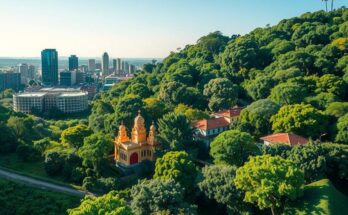The resurgence of conflict in the DRC, marked by M23 rebel advances and international military involvement, has rekindled dark memories of past wars. The humanitarian crisis continues to worsen, with thousands dead since January and growing regional instabilities exacerbating the situation. Effective resolution will require concerted regional efforts alongside internal reforms to address systemic issues within the DRC government.
The Democratic Republic of the Congo (DRC) is currently experiencing escalated conflict as M23 rebels advance towards Kinshasa, having recently captured key eastern cities such as Goma and Bukavu. This resurgence of violence has left communities either preparing for war or fleeing in search of safety, exacerbating an already dire humanitarian crisis in a region plagued by longstanding strife.
The rebel group, linked by the United Nations to support from Rwanda, poses a significant threat to strategic areas like Walikale, a crucial mining hub. Despite the DRC government offering a reward of $5 million for the arrest of M23 leaders, the rebels continue to gain momentum. Reports indicate a death toll of approximately 7,000 from the fighting since January, indicating a serious escalation in violence.
In tandem with M23’s actions, Ugandan troops have increased their presence on the DRC border as they combat the Allied Democratic Forces (ADF) and CODECO, which have also been involved in recent violent offenses against civilians. Observers express concern that the current military involvement of Rwanda and Uganda could mirror the events of the Second Congo War, highlighting the potential for regional instability.
The DRC has been embroiled in conflict for over three decades, leading to the deaths and displacement of millions. Key factors contributing to this violent backdrop include historical grievances between Rwanda and the DRC, rampant ethnic tensions, and the struggle for control over valuable mineral resources. The persistent military interventions by neighboring countries, particularly Rwanda and Uganda, are critical to understanding the current conflict dynamics.
The DRC’s historical context revealed a troubling pattern where armed factions, including M23, exploited the nation’s resources for their own enrichment during past conflicts. In light of recent developments, analysts note that the current conflict is not merely a new flare-up but rather a continuation of past hostilities, driven by competing interests in mineral wealth.
Despite legal challenges, including attempts by the DRC to hold Rwanda accountable in international courts, Rwanda continues to deny allegations of involvement with M23. Nevertheless, the situation remains complicated as Uganda’s role is scrutinized amid accusations of collusion with rebel forces.
Analysis suggests that bringing about peace in the DRC requires a concerted effort from African nations to facilitate negotiations while simultaneously exerting pressure on the Congolese government to address its internal dysfunction and corruption, which have weakened its military opposition and aggravated the conflict. Recent calls for national dialogue and international legal oversight by the International Criminal Court are viewed as hopeful steps toward resolution.
Ultimately, regional analysts stress the urgent necessity for the Congolese people to find stability, as systemic violence profoundly impacts not only their lives but also the broader African continent. Hence, it is posited that the DRC “needs a break” for the sake of its citizens and the overall well-being of the region.
The ongoing conflict in the DRC highlights the persistent cycle of violence fueled by external and internal factors, including foreign military involvement and historical grievances. As M23 rebels advance and regional powers engage in their complex entanglements, the humanitarian crisis deepens. Effective resolution necessitates not only diplomatic and military interventions but also significant reforms within the Congolese government to restore legitimacy and stability for the benefit of the entire African continent.
Original Source: www.aljazeera.com




